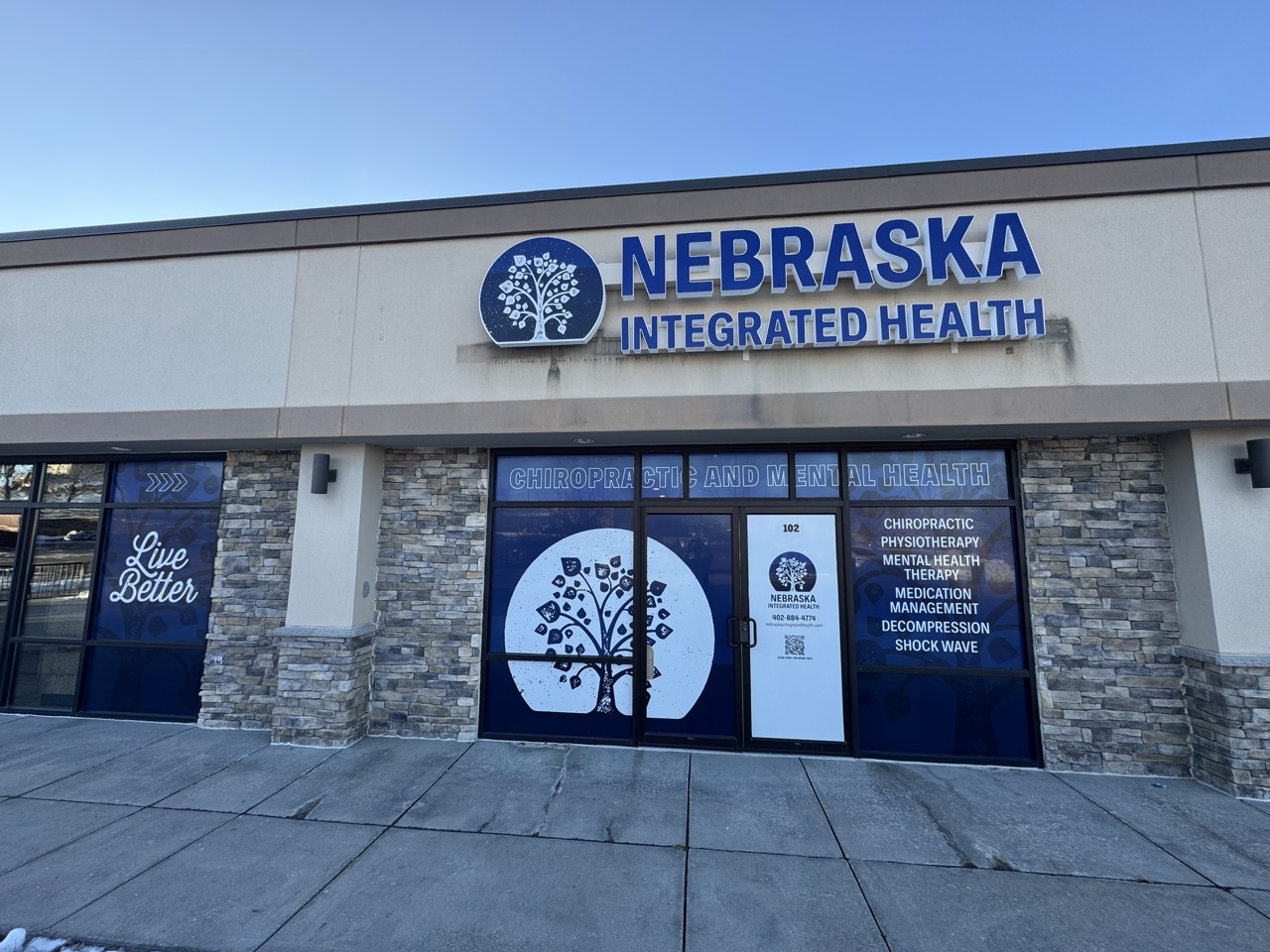Mental Health Therapy
Seen, Heard, Heal
Trusted mental health therapists in Omaha, NE. Locations in Bellevue & Elkhorn, NE providing counseling for anxiety, depression, trauma, and life’s challenges.

Empowering You to Thrive
At Nebraska Integrated Health, we understand that mental health is essential to overall wellness. Our team of licensed therapists in Omaha, Bellevue, Papillion, and Elkhorn, NE provides compassionate, evidence-based counseling for individuals and families. We specialize in treating anxiety, depression, trauma, stress, relationship challenges, and more, helping you address the root causes of emotional struggles.
Our therapy sessions focus on practical tools, personalized strategies, and ongoing support. Whether you are seeking help with managing daily stress, overcoming past trauma, or improving relationships, we are here to guide you toward healing, balance, and long-term resilience.
Take the first step toward better mental health—call today to schedule an appointment with a trusted therapist at Nebraska Integrated Health.

Care That Listens, Understands, and Heals
- Ease anxiety and stress to feel calm and in control again.
- Process trauma and find lasting emotional relief.
- Strengthen relationships through better communication and trust.
- Build resilience to handle life with balance and confidence.
Find Calm & Clarity
Feel Heard & Supported
Build Resilience
Our Focus
Supporting individuals with substance use or behavioral addictions (e.g., alcohol, drugs, gambling). Therapy focuses on understanding the root causes, building coping skills, preventing relapse, and supporting long-term recovery in a non-judgmental environment.
Providing therapy for adolescents and teens facing challenges like anxiety, depression, peer relationships, academic stress, or identity development. Therapy creates a safe, supportive environment for emotional growth and self-expression.
Supporting individuals experiencing anxiety, panic attacks, phobias, social anxiety, and chronic stress. This also includes obsessive-compulsive disorder (OCD), which involves intrusive thoughts and compulsive behaviors. Therapy utilizes evidence-based techniques like Cognitive Behavioral Therapy (CBT), exposure therapy, and mindfulness to reduce symptoms and foster resilience.
Supporting individuals with difficulties managing anger, impulsivity, compulsive behaviors, or emotional outbursts. Therapy aims to build emotional regulation, self-control, and healthier coping strategies to reduce harmful behaviors and improve quality of life.
Helping couples improve communication, rebuild trust, and deepen emotional intimacy. Whether facing conflict, transitioning through life stages, or rebuilding after a crisis, therapy offers tools for restoring connection and enhancing mutual understanding in relationships.
Helping individuals who struggle with persistent sadness, low energy, feelings of hopelessness, or mood swings. Therapy focuses on improving emotional regulation, promoting positive thinking, and building healthy coping strategies to restore balance and motivation.
Providing care for individuals struggling with disordered eating, body image issues, anorexia, bulimia, or binge eating. Therapy emphasizes developing a healthy relationship with food and body, supporting recovery, and promoting self-compassion through evidence-based methods.
Offering support for those coping with the death of a loved one, the end of a relationship, or other significant losses. Therapy creates a compassionate space for processing grief, honoring the loss, and finding meaning while moving forward in a healthy way.
Supporting individuals through significant life changes such as career shifts, relocation, retirement, or major relationship changes. Therapy helps with self-discovery, building confidence, clarifying values, and fostering self-compassion as you navigate new paths.
Providing support for individuals with neurodevelopmental conditions such as ADHD, autism spectrum disorder (ASD), intellectual disabilities, and learning disorders. Therapy focuses on improving executive functioning, social skills, and coping strategies to help individuals succeed academically, socially, and professionally.
Supporting individuals through the emotional and psychological challenges related to pregnancy, postpartum, and early parenthood. Therapy addresses postpartum depression, anxiety, birth trauma, and grief following miscarriage, stillbirth, or infant loss, offering space for healing and recovery during this vulnerable time.
Helping individuals with conditions like borderline, narcissistic, or avoidant personality disorders. Therapy focuses on developing emotional regulation, improving interpersonal relationships, and increasing self-awareness and acceptance, all in a compassionate and non-judgmental space.
Helping individuals navigate chronic or acute stress, whether from work, caregiving, life transitions, or burnout. Therapy includes techniques for emotional regulation, building resilience, and creating boundaries to manage stress more effectively.
Supporting clients in healing from past trauma, including abuse, neglect, accidents, or violence. Therapy includes trauma-informed approaches like Eye Movement Desensitization and Reprocessing (EMDR), somatic therapy, and narrative therapy to process trauma and build emotional resilience.
MEET YOUR providers
Insurance Accepted here
















































Results You Can Feel
COMMON QUESTIONS
Are mental health services covered by insurance?
Yes, our mental health services fall under the same insurance coverage as our chiropractic treatments. We recommend checking with your provider for specific details about your plan.
Are telehealth appointments available for mental health services?
Yes, we offer telehealth options to provide greater accessibility and convenience for our patients.
Do you offer group therapy or community mental health programs?
In addition to individual counseling, we provide comprehensive mental health and substance use evaluations. Future offerings may include group therapy, workshops, and innovative treatments like Spravato (esketamine) for treatment-resistant depression, starting in summer 2025.
Do you prescribe medication at Nebraska Integrated Health?
Medication management services will be available starting in summer 2025, with a licensed psychiatric provider overseeing prescriptions like antidepressants, anxiety medications, and Spravato (esketamine) treatments for treatment-resistant depression.
How are treatment plans developed and adjusted?
Treatment plans are collaboratively developed based on your unique needs and are flexible to adapt as you progress through your care.
How do you ensure patient privacy and confidentiality?
We follow strict HIPAA-compliant protocols, including secure electronic health records and encrypted communications, to protect your sensitive information and maintain confidentiality.
How does Nebraska Integrated Health combine mental health and chiropractic care?
We take a multidisciplinary approach, combining mental and physical health services to address your overall well-being. Therapists and chiropractors collaborate to ensure a cohesive treatment plan for optimal results.
What resources are available between therapy sessions?
Patients have access to educational materials, self-care tools, and clinician support through our secure patient portal to ensure continuous care between appointments.
What should I bring to my first mental health appointment?
Please bring a valid ID, your insurance card (if applicable), and any relevant medical or mental health records to your first session.
What’s the difference between therapy and psychiatry?
Therapy (psychotherapy) focuses on addressing emotional and behavioral challenges through talk-based treatments like CBT or DBT. Psychiatry, on the other hand, involves medical treatment, including medication management, to support mental health conditions. Some patients benefit from both approaches.
What’s the difference between therapy and medication for mental health?
Therapy helps patients develop coping skills, process emotions, and change behavior patterns, while medication addresses chemical imbalances in the brain that contribute to conditions like anxiety, depression, or ADHD. In some cases, a combination of both provides the best results.
Do you offer counseling in Omaha, Bellevue, and Elkhorn, NE?
Yes! We offer counseling and mental health therapy in Omaha, NE at both of our locations. They are conveniently located in Bellevue and Elkhorn, NE.
















